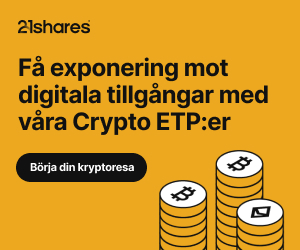Nyheter
Genesis Capital struggles to raise the funds needed to stave off bankruptcy
Publicerad
2 år sedanden

The Nasdaq Crypto Index (NCI) closed Sunday (11/27/22) 1.2% above last week’s closing. The index’s neutral performance was influenced by ether (ETH), up 2.8%, while bitcoin (BTC) remained stable.
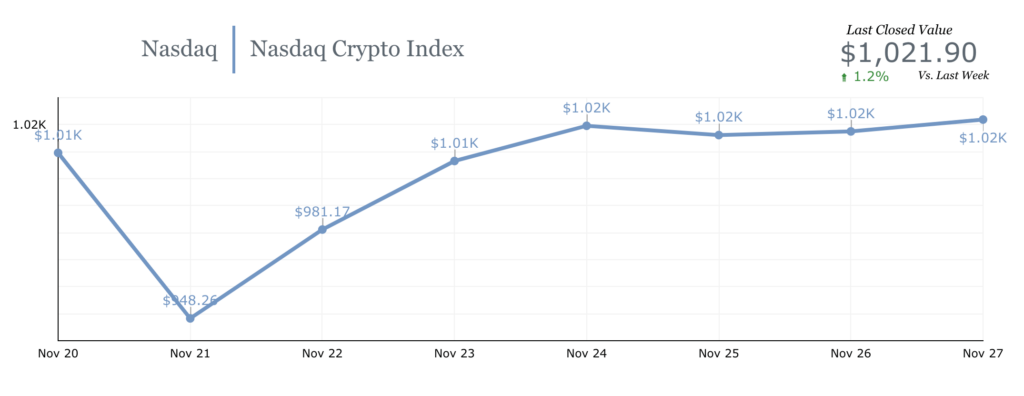
Coming out of a week dominated by fears that Genesis Global Capital would be forced to declare bankruptcy, investors braced for more bad Genesis news and the possibility that other counterparties might become insolvent before the Thanksgiving holiday due to FTX’s collapse.
On Monday, BTC prices began to sink around midday on the East Coast after Bloomberg published an article claiming that Genesis Capital was “struggling” to raise the $1 billion it would need to remain solvent. Genesis Global reacted to the article by releasing a statement that clarified it had “no plans to file bankruptcy imminently.” As closing hours neared for stock markets in the US, BTC registered its weekly low of $15,665—its lowest price point in over two years.
Crypto assets registered a modest recovery on Monday evening, but fell again during early hours of Tuesday. ETH reached its weekly low of $1,082 shortly after the Wall Street Journal published an article confirming Bloomberg’s unidentified Genesis source. In the article, the WSJ claimed that Binance had refused to bail out the troubled crypto lender due to potential conflicts of interest. The article also cited that Genesis had approached private equity firm Apollo Global Management, but did not reveal the state of those negotiations.
Crypto markets began recovering as US markets opened on Tuesday and regained upward momentum in the afternoon when Cleveland Fed President Loretta Mester stated that it “makes sense that we can slow down a bit the … pace of (rate) increases.” Her comments echoed those made by other Fed officials, all of which suggested that the worst of the current rate hike cycle is in the rear view mirror. Before Tuesday gave way to Wednesday, all major US stock indexes closed in the green, BTC gained over $750 and ETH surged by $80.
On Wednesday, prices began losing steam as US stock markets opened. However, later that day, November’s Fed minutes were released. The FOMC’s meeting notes reaffirmed that “a substantial majority of (meeting) participants judged that a slowing in the pace of increase would likely soon be appropriate”.” News that the Fed had confirmed its more dovish outlook in writing would ensure that traditional markets closed in the green once again and that crypto markets would sustain an upward trajectory until late in the night, when BTC reached its weekly high of $16,753.
On Thursday, BTC prices would taper down, before recovering on Friday to settle just above $16,500. BTC prices would remain stable while moving sideways as trading volume slowly fell throughout the weekend. ETH’s price slowly rose throughout the entirety of Friday, eventually registering its weekly high of $1,221 in the day’s final hours and before stabilizing just below that threshold for the remainder of the weekend.
Looking ahead
Investors will continue to monitor the fallout of the FTX collapse, but some analysts believe an eventual Genesis Capital’s bankruptcy may have already been priced in. On Wednesday, the release of the eurozone Core Consumer Price Index (CPI) will be on the radar of investors concerned about global inflation. On Thursday, the release of the Personal Consumption Expenditure (PCE) index could confirm that inflation is waning in the US and reassure investors that the Fed will announce a 50 bps rate hike in mid December.
FTX hack continues to puzzle crypto analysts
During the last two weeks, investors have been monitoring developing stories related to mysterious hacks. After a week of disastrous news for FTX, the troubled exchange managed to give investors one final scare before turning in for the weekend by announcing it had been hacked. Initial reports suggested $600 million in tokens were drained from FTX wallets
The breach was originally divulged by an account administrator in an FTX Support Telegram chat. Later, FTX General Counsel Ryne Miller claimed in a tweet that the transactions resulted from “precautionary steps to move all digital assets to cold storage.” Others speculated that the funds were moved at the behest of Bahamian Financial authorities. Neither statements appear to be true.
During the following week, the hacker converted such a large volume of tokens into ETH, making the wallet in question the 35th largest amongst all ETH addresses on November 16th. Last week, the malicious actor spent the weekend converting millions of ETH to Ren bitcoin (renBTC), an ERC-20 token used to represent the value of BTC in other blockchains, possibly in an attempt to launder the funds. Analysts continue to monitor the hacker’s activities, and we’ll keep a close eye on the matter to make sure Hashdex investors stay up-to-date with the unfoldings.
The information contained herein (“Information”) may not be reproduced or redistributed in whole or in part, in any format, without the express written approval of Hashdex Asset Management Ltd. (“Hashdex”) and its affiliates and subsidiaries (“Hashdex Group”). By accepting this document, you acknowledge and agree that all of the Information contained in this document is proprietary to Hashdex Group. While not explicitly referenced within this piece, Hashdex Group manages the Hashdex Nasdaq Crypto Index ETF, Hashdex Nasdaq Ethereum ETF, Hashdex Nasdaq Bitcoin ETF, Hashdex DeFi Index Fund, Hashdex Smart Contract Platforms Index ETF and other investment vehicles focused on digital assets (collectively the “Fund” and each a “Fund”) which invests in digital tokens. The Information is not an offer to buy or sell, nor is it a solicitation of an offer to buy or sell, interests in the Funds or any advisory services or any other security or to participate in any advisory services or trading strategy. If any offer and sale of securities is made, it will be pursuant to the confidential offering memorandum of the Fund (the Offering Memorandum). Any decision to make an investment in the Fund should be made after reviewing such Offering Memorandum, conducting such investigations as the investor deems necessary and consulting the investor’s own investment, legal, accounting and tax advisors in order to make an independent determination of the suitability and consequences of an investment.
Each Fund seeks to track a relevant index. The performance of each Fund will vary from the performance of the relevant index that it seeks to track. The Information is being provided to you solely for discussion purposes and may not be used or relied on for any purpose (including, without limitation, as legal, tax or investment advice) without the express written approval of Hashdex Group. Certain statements reflect Hashdex Group’s views, estimates, opinions or predictions (which may be based on proprietary models and assumptions, including, in particular, Hashdex Group’s views on the current and future market for digital assets), and there is no guarantee that these views, estimates, opinions or predictions are currently accurate or that they will be ultimately realized. To the extent these assumptions or models are not correct or circumstances change, the actual performance of Hashdex Group and the Funds may vary substantially from, and be less than, the estimated performance. None of Hashdex Group, the Funds nor any of their respective affiliates, shareholders, partners, members, directors, officers, management, employees or representatives makes any representation or warranty, express or implied, as to the accuracy or completeness of any of the Information or any other information (whether communicated in written or oral form) transmitted or made available to you.
Each of the aforementioned parties expressly disclaims any and all liability relating to or resulting from the use of the Information or such other information. Except where otherwise indicated, the Information is based on matters as they exist as of the date of preparation and not as of any future date and will not be updated or otherwise revised to reflect information that subsequently becomes available, or circumstances existing or changes occurring after the date hereof. Investing in financial markets, the Funds and digital assets, including Bitcoin, DeFi tokens, and Ethereum, involves a substantial degree of risk. There can be no assurance that the investment objectives described herein will be achieved. Any investment in the Funds may result in a loss of the entire amount invested. Investment losses may occur, and investors could lose some or all of their investment. No guarantee or representation is made that Hashdex’s investment strategy, including, without limitation, its business and investment objectives, diversification strategies or risk monitoring goals, will be successful, and investment results may vary substantially over time. Nothing herein is intended to imply that the Hashdex Group’s investment methodology or that investing any of the protocols or tokens listed in the Information or the Funds may be considered “conservative,” “safe,” “risk free,” or “risk averse.” Neither historical returns nor economic, market or other performance is an indication of future results. Certain information contained herein (including financial information) has been obtained from published and non-published sources. Such information has not been independently verified by Hashdex Group, and Hashdex Group does not assume responsibility for the accuracy of such information. Hashdex Group does not provide tax, accounting or legal advice. Certain information contained herein constitutes forward-looking statements, which can be identified by the use of terms such as “may,” “will,” “should,” “expect,” “anticipate,” “project,” “estimate,” “intend,” “continue” or “believe” (or the negatives thereof) or other variations thereof. Due to various risks and uncertainties, including those discussed above, actual events or results, the ultimate business or activities of Hashdex Group or the Funds or the actual performance of Hashdex Group, the Funds, or digital tokens may differ materially from those reflected or contemplated in such forward-looking statements. As a result, investors should not rely on such forward- looking statements in making their investment decisions. None of the Information has been filed with the U.S. Securities and Exchange Commission, any securities administrator under any state securities laws or any other governmental or self-regulatory authority. No governmental authority has opined on the merits of the offering of any securities by the Funds or Hashdex, or the adequacy of the information contained herein.
Du kanske gillar
-
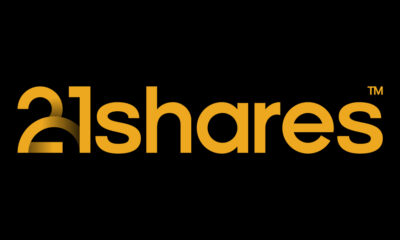

From digital asset to safe haven: Why is Bitcoin acting like gold?
-
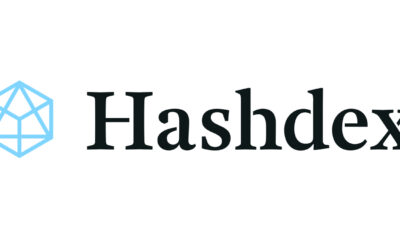

Can crypto outperform amidst the current market turmoil?
-
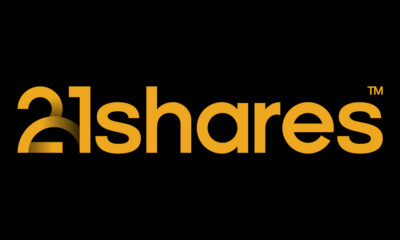

A pro-crypto agenda is underway
-
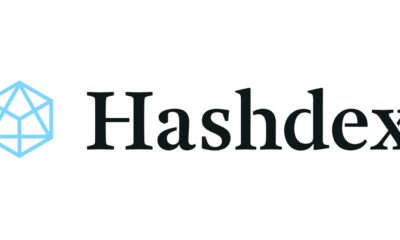

Gold’s rally may signal what’s ahead for BTC
-
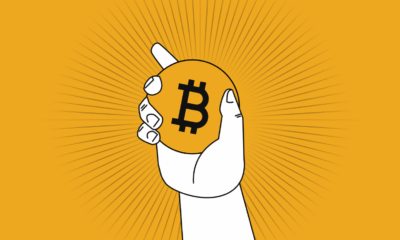

Bitcoin in the eye of the storm: A market shaped by two forces
-


Guld-ETFer slår Bitcoin-ETFer kraftigt under första kvartalet 2025
Nyheter
From digital asset to safe haven: Why is Bitcoin acting like gold?
Publicerad
14 timmar sedanden
28 april, 2025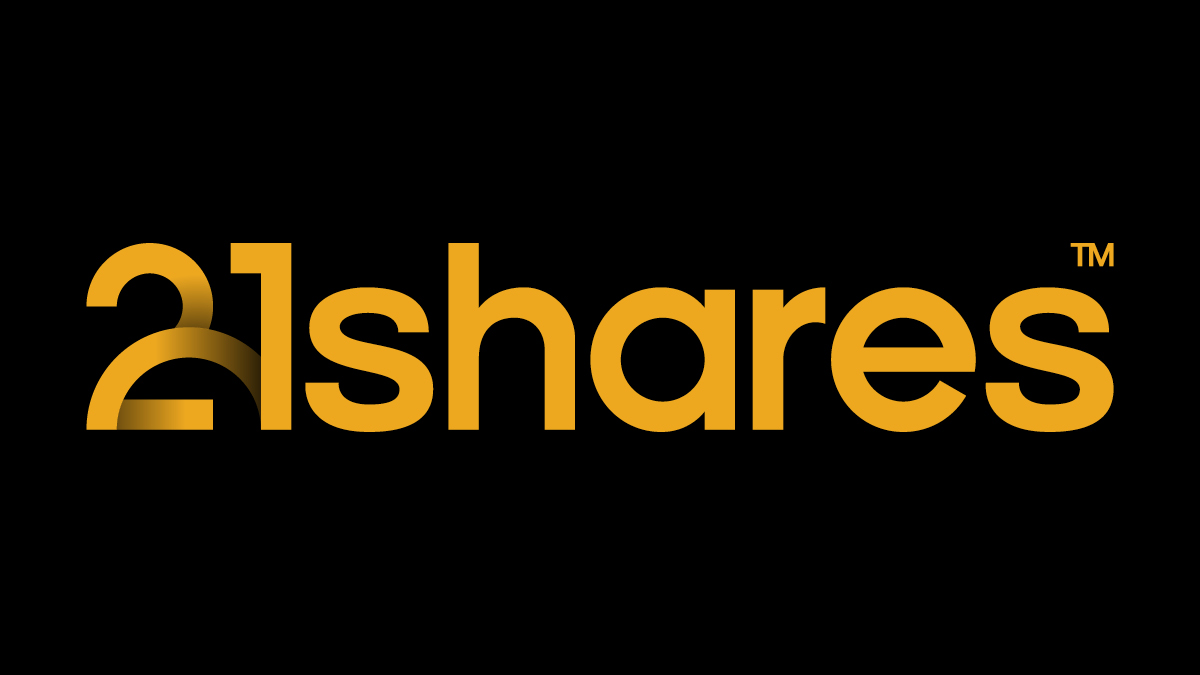
Bitcoin’s price has taken a different path from U.S. stocks over the past weeks. While major indexes such as the S&P 500 and Nasdaq have experienced declines, Bitcoin has risen to its highest levels in recent months, positioning itself as a safe haven, similar to gold. Understand how Bitcoin and gold have been synced for some time and what the correlation might look like in the future.
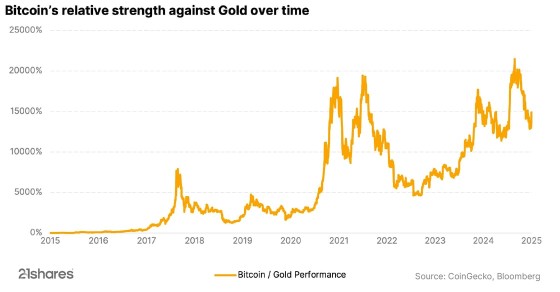

Ethereum’s big reboot: Why investors should be excited
Ethereum is making headlines due to a potential change in its core software, the Ethereum Virtual Machine (EVM), that operates across thousands of computers, enabling Ethereum to execute smart contracts and securely track transactions. However, Ethereum’s co-founder, Vitalik Buterin, has suggested replacing the EVM with a new system called RISC-V. Discover why the change is necessary and its potential impact on investors.
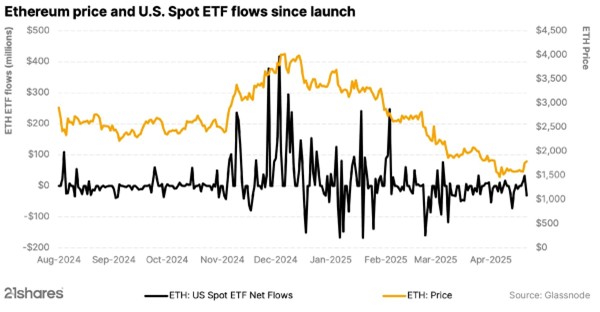


Thousands of altcoins, but no altcoin season: What comes next?
Over the past year, the crypto market has entered a new era. Bitcoin hit new all-time highs, outperforming other cryptocurrencies and decoupling from the stock market. Unlike previous cycles, the expected “altcoin season” did not occur, with Bitcoin remaining strong and money not flowing into other cryptocurrencies or altcoins. So, the big question is: Has altcoin season run its course?
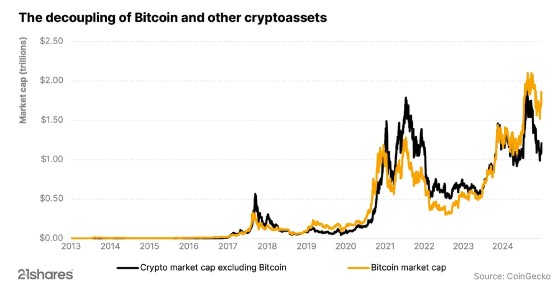

Research Newsletter
Each week the 21Shares Research team will publish our data-driven insights into the crypto asset world through this newsletter. Please direct any comments, questions, and words of feedback to research@21shares.com
Disclaimer
The information provided does not constitute a prospectus or other offering material and does not contain or constitute an offer to sell or a solicitation of any offer to buy securities in any jurisdiction. Some of the information published herein may contain forward-looking statements. Readers are cautioned that any such forward-looking statements are not guarantees of future performance and involve risks and uncertainties and that actual results may differ materially from those in the forward-looking statements as a result of various factors. The information contained herein may not be considered as economic, legal, tax or other advice and users are cautioned to base investment decisions or other decisions solely on the content hereof.
Nyheter
WELC ETF ger exponering mot företag inom sällanköpsvaror
Publicerad
15 timmar sedanden
28 april, 2025
Amundi S&P Global Consumer Discretionary ESG UCITS ETF DR EUR (D) (WELC ETF) med ISIN IE00061J0RC6, strävar efter att spåra S&P Developed Ex-Korea LargeMidCap Sustainability Enhanced Consumer Discretionary index. Det S&P-utvecklade ex-Korea LargeMidCap Sustainability Enhanced Consumer Discretionary-indexet spårar stora och medelstora företag från den diskretionära konsumentsektorn. ESG-kriterier (miljö, social och bolagsstyrning) beaktas vid valet av värdepapper.
Den börshandlade fondens TER (total cost ratio) uppgår till 0,18% p.a.. Amundi S&P Global Consumer Discretionary ESG UCITS ETF DR EUR (D) är den billigaste ETF som följer S&P Developed Ex-Korea LargeMidCap Sustainability Enhanced Consumer Discretionary index. ETFen replikerar det underliggande indexets prestanda genom fullständig replikering (köper alla indexbeståndsdelar). Utdelningarna i ETFen delas ut till investerarna (Årligen).
Amundi S&P Global Consumer Discretionary ESG UCITS ETF DR EUR (D) är en mycket liten ETF med 5 miljoner euro förvaltade tillgångar. Denna ETF lanserades den 20 september 2022 och har sin hemvist i Irland.
Investeringsmål
AMUNDI S&P GLOBAL CONSUMER DISCRETIONARY ESG UCITS ETF DR – EUR (D) försöker replikera, så nära som möjligt, resultatet för S&P Developed Ex-Korea LargeMidCap Sustainability Enhanced Consumer Discretionary Index (Netto Total Return Index). Denna ETF har exponering mot stora och medelstora företag i utvecklade länder. Den innehåller uteslutningskriterier för tobak, kontroversiella vapen, civila och militära handeldvapen, termiskt kol, olja och gas (inkl. Arctic Oil & Gas), oljesand, skiffergas. Den är också utformad för att välja ut och omvikta företag för att tillsammans förbättra hållbarhet och ESG-profiler, uppfylla miljömål och minska koldioxidavtrycket.
Handla WELC ETF
Amundi S&P Global Consumer Discretionary ESG UCITS ETF DR EUR (D) (WELC ETF) är en europeisk börshandlad fond. Denna fond handlas på flera olika börser, till exempel Deutsche Boerse Xetra.
Det betyder att det går att handla andelar i denna ETF genom de flesta svenska banker och Internetmäklare, till exempel Nordnet, SAVR, DEGIRO och Avanza.
Börsnoteringar
Största innehav
Denna fond använder fysisk replikering för att spåra indexets prestanda.
| Namn | Valuta | Vikt % | Sektor |
| AMAZON.COM INC | USD | 18.89 % | Sällanköpsvaror |
| TESLA INC | USD | 13.29 % | Sällanköpsvaror |
| HOME DEPOT INC | USD | 5.75 % | Sällanköpsvaror |
| LVMH MOET HENNESSY LOUIS VUI | EUR | 5.44 % | Sällanköpsvaror |
| TOYOTA MOTOR CORP | JPY | 4.58 % | Sällanköpsvaror |
| MCDONALD S CORP COM NPV | USD | 2.63 % | Sällanköpsvaror |
| LOWE S COS INC COM US 0.50 | USD | 2.38 % | Sällanköpsvaror |
| SONY GROUP CORP (JT) | JPY | 2.25 % | Sällanköpsvaror |
| BOOKING HOLDINGS INC | USD | 2.02 % | Sällanköpsvaror |
| TJX COMPANIES INC | USD | 1.89 % | Sällanköpsvaror |
Innehav kan komma att förändras
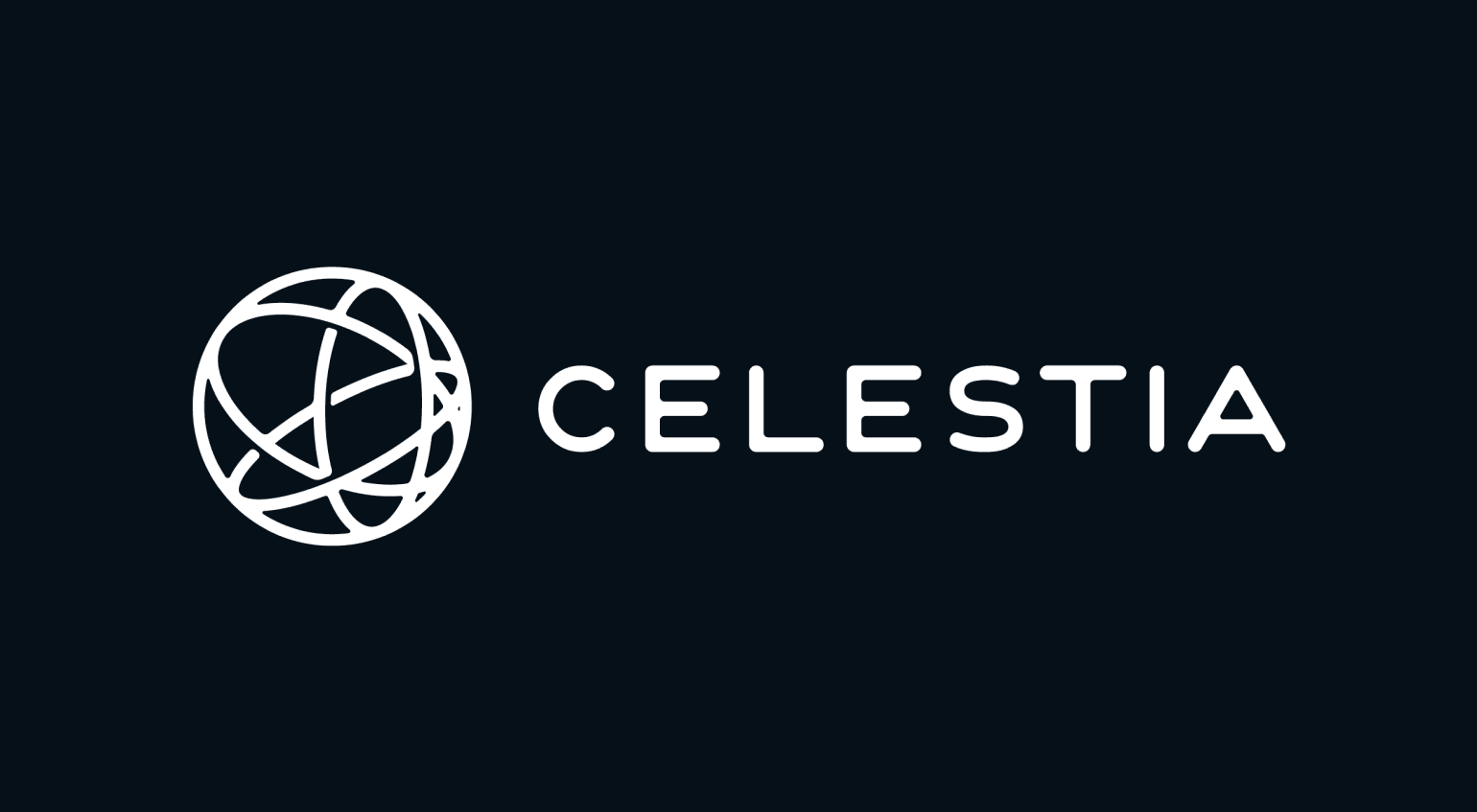
To understand Celestia’s value and its role in the ecosystem, it’s helpful to first understand how traditional blockchain systems are structured.
Most blockchains, like Ethereum or Bitcoin, are monolithic which means they perform all major functions (consensus, data availability, and execution) on a single layer. This design ensures security but according to new modular networks, limits scalability and flexibility.
The modular blockchain thesis, which Celestia is leading, proposes separation of layers and respective responsibilities in the network. Instead of having one network and its validators perform all of its functions, it may be better to have specialized layers:
• Consensus Layer: Ensures that all nodes agree on the order of transactions.
• Data Availability Layer: Ensures transaction data is accessible to all participants.
• Execution Layer: Processes the actual logic and computation of smart contracts.
By unbundling these components, developers can build more efficient, flexible systems that scale far beyond what monolithic blockchains can support. Not all applications need similar levels of security and not all applications need to scale up to millions of transactions. Additionally, one application might be scaling beyond the capabilities of its host network, severely effecting the available data throughput of other applications. This limits developers to the monolithic technology stack provided by a virtual machine such as Ethereum’ EVM.
The Issue of Data Availability
One of the most misunderstood yet crucial components of any blockchain is data availability. In simple terms, it ensures that the data behind each block is fully accessible and verifiable by all participants in the network. Another way to describe it is as the confidence a user can have that the data required to verify a block is really available to all network participants. Data availability is therefore important to all stakeholders of the blockchain ecosystem.
If a block producer withholds data, then nodes cannot verify the block, which leads to potential censorship or fraud.
Traditionally, a blockchain network can offer data availability with the following mechanisms:
• Full Replication: Every node stores the entire blockchain and verifies all data. Secure but not quite scalable.
• Sharding: Breaks the blockchain into smaller pieces (shards), spreading data across nodes. Scalable but highly complex to implement.
• Committee-Based Models: Small groups of nodes are trusted to verify data availability. Efficient, but less decentralized.
Celestia takes a completely different approach using a novel method called Data Availability Sampling (DAS). Instead of requiring every node to download all data, DAS allows lightweight nodes to randomly sample small chunks of a block. If enough pieces are retrievable, the node can confidently assume the full block is available. This slashes resource requirements while maintaining security and decentralization.
Why Data Availability Matters
Data availability might sound like a nerdy technical term, but it’s one of the most important yet one of less invisible parts of how blockchains work.
Let’s say you’re using a crypto app to trade tokens, store art, or move money. Every time you do something, that action (also referred to as a transaction) needs to be recorded and shared with the rest of the network so everyone agrees it happened. If that data disappears or can’t be verified, the whole system becomes untrustworthy. You might think your tokens moved but if no one else can see that record or a different version of that record, it’s as if it never happened.
Here’s a real-life parallel: imagine a public scoreboard at a sports game. If the scorekeeper shows the score to only a few people and then hides the board, how can the rest of the crowd trust the result? Everyone needs to see the score to believe it’s fair. In crypto, data availability is what makes sure the scoreboard is always visible to all participants at any time.
How DAS Changes the Game
Traditionally, ensuring data availability meant every node had to download and verify the entire block of data for any purpose related to particular data inside the block, like reading a whole newspaper just to check one article. Ethereum and most competing monolithic layer-1’s operate this way. It works, but it’s expensive, slow, and becomes less practical as blockchains scale in terms of data throughput required by its Dapps therefore limiting the types of applications that developers can build.
Celestia’s Data Availability Sampling (DAS) is a breakthrough that lets even simple devices (like smartphones) verify that a block’s data is available—by checking just a few random pieces. If enough pieces are found and correct, the network can be confident the full block is truly there and correct.
This innovation means:
• Light clients can safely participate in the network without downloading everything.
• Rollups and app-chains can post their data to Celestia with minimal overhead.
• Scalability skyrockets without sacrificing decentralization.
Celestia’s Role in Scaling Applications
Celestia is the first blockchain designed specifically to be a modular data availability layer. That means it doesn’t execute smart contracts or handle transactions directly, instead, it provides a foundation for others to build new networks, also referred to as rollups.
Developers can launch rollups or full execution environments, and use Celestia to handle the consensus and data availability side. This unlocks several key benefits:
• Massive scalability: Apps can scale independently from each other.
• Customization: Developers choose their own virtual machines, consensus mechanism and execution logic.
• Decentralization: Thanks to DAS, even small devices can validate the system.
This approach flips the script on how we think about launching and scaling blockchains. Instead of competing for space on a monolithic chain, apps get their own chains, backed by Celestia’s secure and scalable data availability layer while giving developers full stack control over their applications.
Celestia Enables Scalability and Offers Full-Stack Control
Using the restaurant example from Sui vs Aptos. Imagine a big, busy restaurant where the chefs, waiters, and cashiers all work in the same small kitchen. It gets crowded, orders take forever, and sometimes things go wrong while the backlog of orders keeps growing. That’s how traditional blockchains work, doing everything in one place.
Now imagine if the restaurant separated the jobs: the chefs cook in a big kitchen, waiters serve from a clean dining area, and the cashiers handle payments at the front desk. Everything runs smoother, faster, and the restaurant can grow in a environment that is less prone to congestion. That is what Celestia is doing for blockchains. Let’s say a small specialty restaurant opens up next door, leveraging Celestia’s register and order management system. That new restaurant can fully focus on delivering the best food and experience to customers, knowing that Celestia’s technology won’t be the limiting factor when scaling up their kitchen. The modularity that Celestia’s restaurant offers is allowing a lot of small scale restaurants to exist without the overhead of individual administrative work. It goes even a step further, Celestia allows you to just use it register while letting smaller restaurants pick their own kitchen (execution environment) and order management system (consensus layer).
In conclusion, Celestia is challenging the believe that blockchains should always be monolithic and blockchains need to offer the same technology stack to all developers on its chain. It is a significant leap forward in the crypto ecosystem and opens possibilities that were previously not feasible.
Diversify Crypto Exposure to Modular Blockchain Technology with the VanEck Celestia ETN
Key features of the VanEck Celestia ETN
• Celestia enables secure scaling of blockchain applications with modular technology.
• Fully-collateralized by TIA in cold-storage.
• Total return of TIA: Tracks the MarketVector™ Celestia VWAP Close Index (MVTIAV).
Why VanEck Crypto ETNs? Here’s why:
• With nearly 70 years in asset management and a strong track record in crypto, we bring deep industry knowledge and proven reliability.
• We combine traditional financial strengths with cutting-edge crypto innovation, backed by a CEO who truly believes in crypto’s future.
• We ensure clarity in our product structures and avoid high-risk or opaque practices, with assets fully backed by cryptocurrency in secure cold storage.
• Our assets are secured by a licensed European bank in Liechtenstein, providing top-tier compliance and security.
• We use the safest institutional custody setup available, prioritizing your security over cost savings.
Crypto is an asset class with high potential returns but investing in digital assets comes with great risk, why choose products that potentially introduce even more risks? Choose VanEck for a secure, transparent, and expertly managed crypto investment experience.
Main Risk Factors:
Investors should note that there is no direct ownership for the crypto assets, but a claim against Issuer to receive such assets.
• Complexity risk: The complexity of the project and its technological concepts make it challenging to assess its viability and valuation.
• Adoption risk: Celestia introduces additional adoption risk as it is uncertain if the concept of modular blockchains will succeed.
• Technology risk: Celestia introduces additional technology risk due to the technology being less mature and therefore could be more prone to bugs and exploits.
• Regulatory Risk: market disruptions and governmental interventions may make digital assets illegal.
• Risk of Losses and Volatility: The trading prices of many digital assets have experienced extreme volatility in recent periods and may continue to do so. There is a risk of total loss as no guarantee can be made regarding custody due to hacking risk, counterparty risk and market risk.
• Other risks specific to this ETN’s Digital Assets can also be found on the VanEck Crypto Academy.
This is not financial research but the opinion of the author of the article. We publish this information to inform and educate about recent market developments and technological updates, not to give any recommendation for certain products or projects. The selection of articles should therefore not be understood as financial advice or recommendation for any specific product and/or digital asset. We may occasionally include analysis of past market, network performance expectations and/or on-chain performance. Historical performance is not indicative for future returns.
IMPORTANT INFORMATION
For informational and advertising purposes only.
This information originates from VanEck (Europe) GmbH, Kreuznacher Strasse 30, 60486 Frankfurt am Main, Deutschland and VanEck Switzerland AG, Genferstrasse 21, 8002 Zurich, Switzerland.
It is intended only to provide general and preliminary information to investors and shall not be construed as investment, legal or tax advice. VanEck (Europe) GmbH and its associated and affiliated companies (together “VanEck”) assume no liability with regards to any investment, divestment or retention decision taken by the investor on the basis of this information. Views and opinions expressed are current as of the date of this information and are subject to change with market conditions. Certain statements contained herein may constitute projections, forecasts and other forward looking statements, which do not reflect actual results. VanEck makes no representation or warranty, express or implied regarding the advisability of investing in securities or digital assets generally or in the product mentioned in this information (the “Product”) or the ability of the underlying Index to track the performance of the relevant digital assets market.
Investing is subject to risk, including the possible loss of principal up to the entire invested amount and the extreme volatility that ETNs experience. You must read the prospectus and KID before investing, in order to fully understand the potential risks and rewards associated with the decision to invest in the Product. The approved Prospectus is available at www.vaneck.com. Please note that the approval of the prospectus should not be understood as an endorsement of the Products offered or admitted to trading on a regulated market.
The underlying Index is the exclusive property of MarketVector GmbH, which has contracted with CC Data Limited to maintain and calculate the Index. CC Data Limited uses its best efforts to ensure that the Index is calculated correctly. Irrespective of its obligations towards the MarketVector GmbH, CC Data Limited has no obligation to point out errors in the Index to third parties.
Investing is subject to risk, including the possible loss of principal up to the entire invested amount and the extreme volatility that ETNs experience. You must read the prospectus and KID before investing, in order to fully understand the potential risks and rewards associated with the decision to invest in the Product. The approved Prospectus is available at www.vaneck.com. Please note that the approval of the prospectus should not be understood as an endorsement of the Products offered or admitted to trading on a regulated market.
Performance quoted represents past performance, which is no guarantee of future results and which may be lower or higher than current performance.
Current performance may be lower or higher than average annual returns shown. Performance shows 12 month performance to the most recent Quarter end for each of the last 5yrs where available. E.g. ’1st year’ shows the most recent of these 12-month periods and ’2nd year’ shows the previous 12 month period and so on. Performance data is displayed in Base Currency terms, with net income reinvested, net of fees. Brokerage or transaction fees will apply. Investment return and the principal value of an investment will fluctuate. Notes may be worth more or less than their original cost when redeemed.
Index returns are not ETN returns and do not reflect any management fees or brokerage expenses. An index’s performance is not illustrative of the ETN’s performance. Investors cannot invest directly in the Index. Indices are not securities in which investments can be made.No part of this material may be reproduced in any form, or referred to in any other publication, without express written permission of VanEck.
© VanEck (Europe) GmbH / © VanEck Switzerland AG

From digital asset to safe haven: Why is Bitcoin acting like gold?

WELC ETF ger exponering mot företag inom sällanköpsvaror

Introduction to Celestia

YYYY ETF använder optioner för att ge månadsvis utdelning

Virtune lanserar Virtune Stellar ETP på Nasdaq Stockholm

Crypto Market Risks & Opportunities: Insights on Bybit Hack, Bitcoin, and Institutional Adoption

Montrose storsatsning på ETFer fortsätter – lanserar Sveriges första globala ETF med hävstång

Svenskarna har en ny favorit-ETF

MONTLEV, Sveriges första globala ETF med hävstång

Sju börshandlade fonder som investerar i försvarssektorn
Populära
-
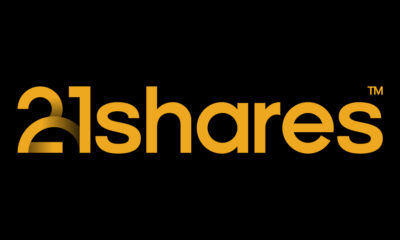
 Nyheter4 veckor sedan
Nyheter4 veckor sedanCrypto Market Risks & Opportunities: Insights on Bybit Hack, Bitcoin, and Institutional Adoption
-
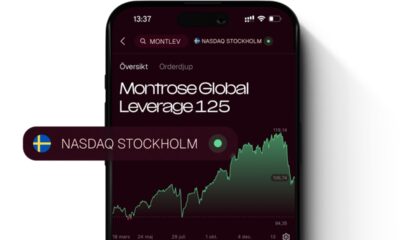
 Nyheter4 veckor sedan
Nyheter4 veckor sedanMontrose storsatsning på ETFer fortsätter – lanserar Sveriges första globala ETF med hävstång
-

 Nyheter4 veckor sedan
Nyheter4 veckor sedanSvenskarna har en ny favorit-ETF
-
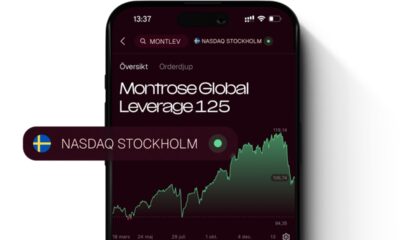
 Nyheter4 veckor sedan
Nyheter4 veckor sedanMONTLEV, Sveriges första globala ETF med hävstång
-

 Nyheter3 veckor sedan
Nyheter3 veckor sedanSju börshandlade fonder som investerar i försvarssektorn
-

 Nyheter3 veckor sedan
Nyheter3 veckor sedanVärldens första europeiska försvars-ETF från ett europeiskt ETF-företag lanseras på Xetra och Euronext Paris
-

 Nyheter4 veckor sedan
Nyheter4 veckor sedanEuropeisk försvarsutgiftsboom: Viktiga investeringsmöjligheter mitt i globala förändringar
-

 Nyheter3 veckor sedan
Nyheter3 veckor sedan21Shares bildar exklusivt partnerskap med House of Doge för att lansera Dogecoin ETP i Europa


